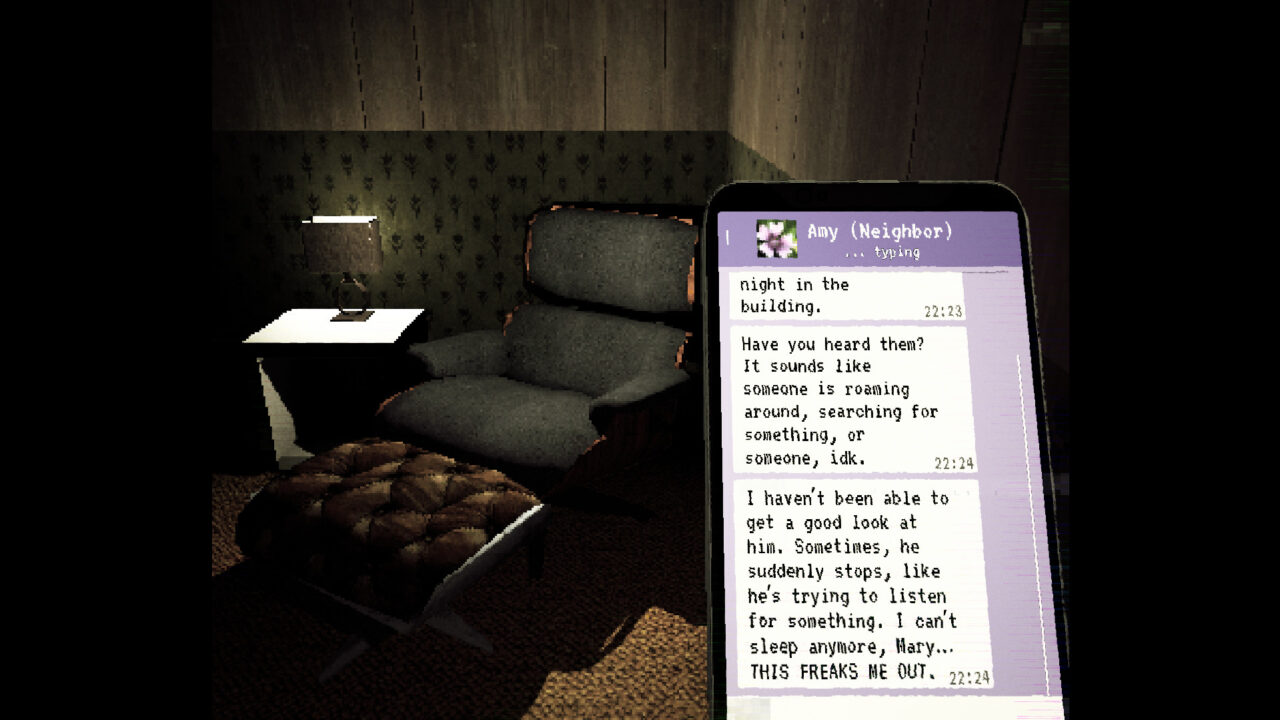Scared Protector – How MOTHER Enhances Fear Through Saving Others

In horror, most of the time, you’re keeping yourself safe from something. Some killer or ghost or monster is creeping around in the dark, and running into it will be bad news for you. Maybe you’re armed, maybe you’re not, but you need to use whatever tools you have to stay safe from whatever is stalking you.
It’s frightening to know that you’re being hunted. That you’re in near-constant danger from something that will unexpectedly find you and attack. It’s unsettling to feel eyes staring back at you from every shadow, or something standing just out of sight around every corner. That terror creeps through you as every noise and every dark place gets loaded with meaning and lethal possibility.
So, how do we react to this feeling? We walk slowly. We peek around corners. We keep our weapons close, finger curled into the trigger. We move with caution when we have to protect our own lives, and we analyze our situations again and again to be sure that the next step isn’t our last.
But what if keeping ourselves safe wasn’t the most important part of a horror game? What if we had something else that was far more crucial to protect?
MOTHER (out now on itch.io and Steam) is a horror game about a newly-widowed mother of two children, Mary, who is suffering from insomnia and grief as she tries her best to take care of her children in this bleak new existence. Mary and her family are also being attacked by two beastly creatures who keep trying to kill the kids in the middle of the night.
For Mary, and players of MOTHER, there is something far more important to keep safe throughout our time here: our children. While we do need to keep our protagonist alive, this concern comes secondary to keeping the kids out of danger, or pulling them out of trouble when you hear their cries pierce the night. This makes sweeping changes to how horror works in this title and how we approach it, creating an experience that is built to terrify us all while we have to throw ourselves headlong into danger instead of approaching it carefully. We have to act quickly, almost carelessly, as we confront our fears, creating an incredible tension that may be enough to break some of its players.
IN MOTHER, you’ll be spending your time inside of your apartment with your two kids at night. Each day, you have a few tasks to take care of like taking your meds, unpacking boxes, and helping the kids clean up their rooms. Once that’s all done, it’s off to bed for everyone. Until something horrible inevitably forces you out of bed and into the halls.
There are two monsters in this game, and while you’re far from safe from them, your children are always in greater danger. You can scare one foe off with the light from your phone (and later, a gun), but your kids don’t have any such handy tools. As such, these lumbering beast tends to grab your kids from their beds and scurry off to another corner of the house to attack them. When this happens, you need to rush to the location in your apartment where they’ve been taken in time to free them before they’re badly injured.
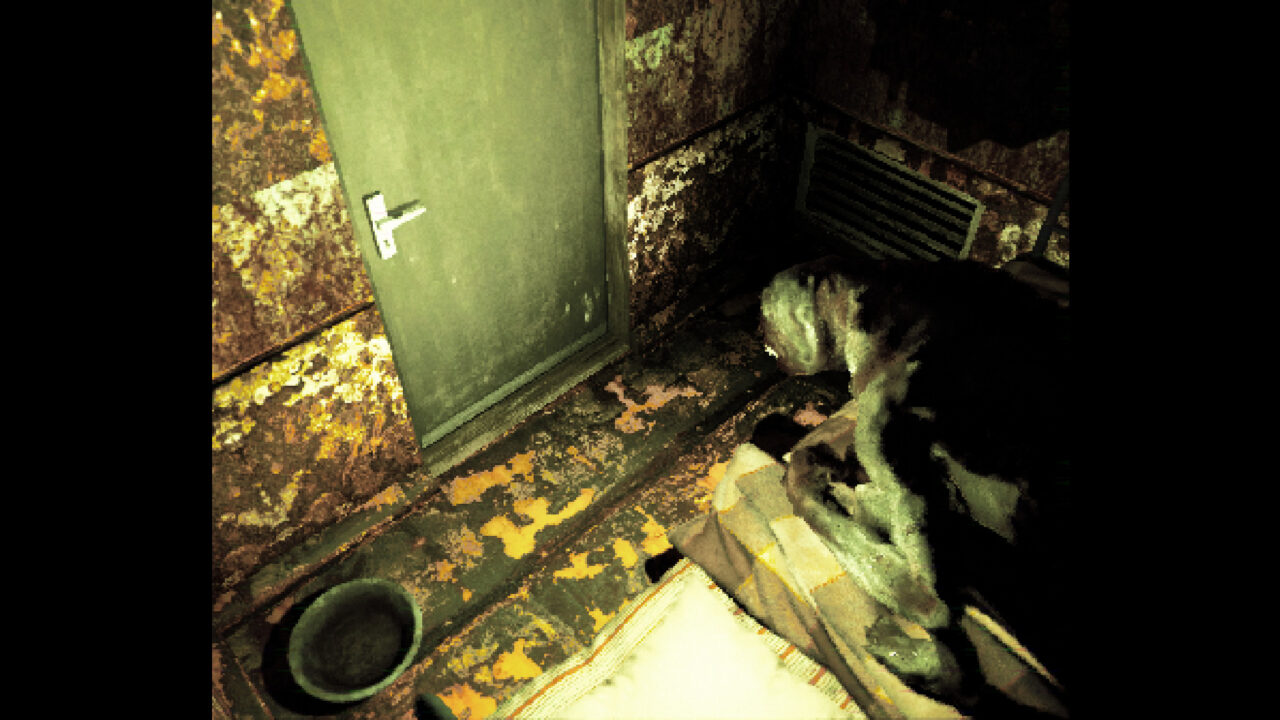
In MOTHER, the apartment is a tiny place made up of only a few rooms, so that shouldn’t be terribly hard, right? Well, you have a big problem in that the lighting in this place is attached to a dodgy fuse box, meaning if you flick on too many lights, you’ll blow the power in your apartment and find yourself in the dark. You can go to the breaker panel and reset the switches, bringing power back on, but this wastes a lot of time when your kid is in danger. Your best bet, then, is running through the apartment in near-total darkness, stumbling until you manage to find the right room to free your child.
So, you need to learn the layout of your apartment if you’re going to have a chance – so well that you can navigate it without being able to see much. This is something I honestly hadn’t gotten down even at the end of the game, and I kept taking the wrong turn or mixing up notable features. I always felt lost, rushing from room to room as I tried to find my kids.
The mixture of panic at trying to save them, combined with fumbling in the dark, made for an gut-twisting feeling of terror the whole time I played. It simulated that sense of panic I assume any parent would feel if their kid was being hurt somewhere in the house. A place once familiar and safe becomes a realm of fear when in the darkness and under assault by unknown beings, and I keenly felt that sensation throughout MOTHER.
This feeling is made all the worse because your children can die permanently if they take too much damage. The game keeps a running score of their well-being as you play, and if it dips too low, your child dies. You can try to reassure them or offer them food to get small boosts throughout the game, but if you fail them too many times, they will be killed. So, each time one of them is in danger, you find yourself rushing through the house to find them, knowing they can’t endure much of this pain before they’ll be gone forever.
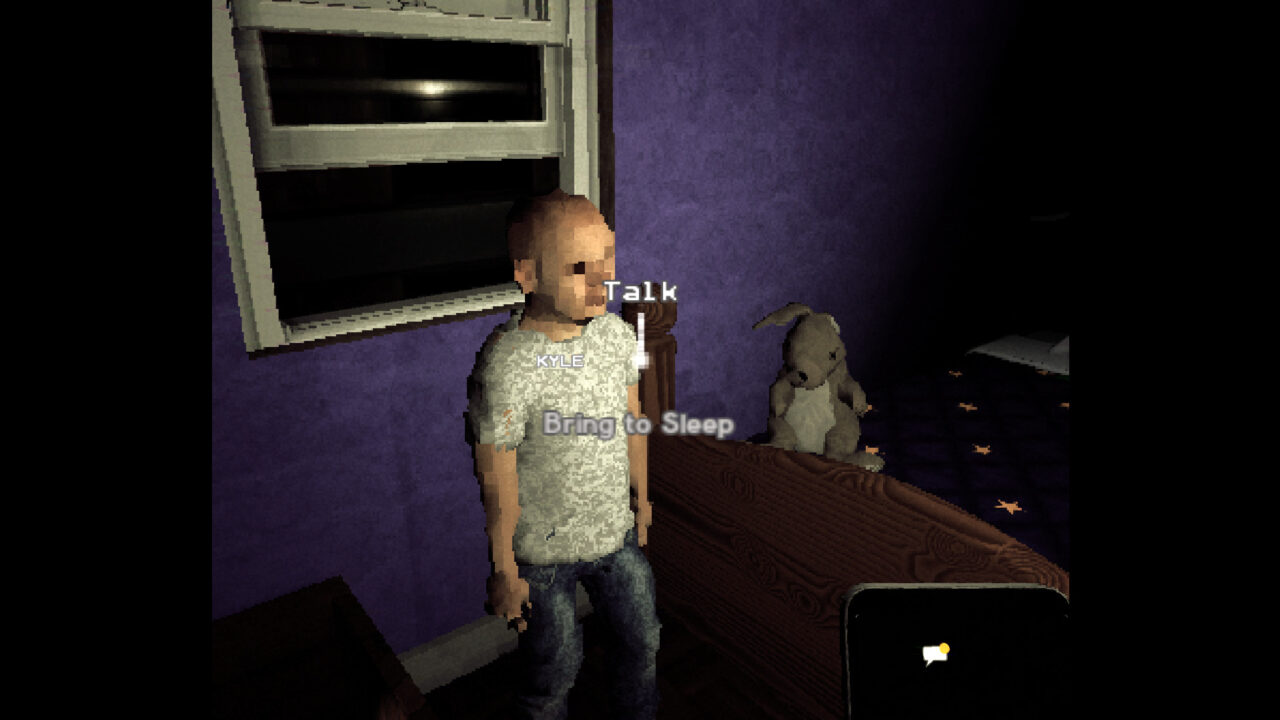
But what do YOU have to fear when the monster is busy hurting your child? To an extent, you’d assume that you had little to fear when the monster was busy killing your child. It sounds morbid to say it that way, but if the game’s monster is busy with your kid, they can’t hurt you, right? Perhaps for some, this will lessen their fear, but for me, it heightened it, because I knew I wasn’t the only thing I had to protect as I played.
Most of the time, you have an active hand in your survival in horror games. You have the weapons, you choose when to run, when to hide, etc. MOTHER still has you in an active role in your survival, but that role is limited, to an extent, because you can’t do anything besides react to your kids when they’re in danger. You can’t give them a weapon or hide them somewhere. You just have to come running when they’re in danger, and you’re always at a disadvantage when your role is purely reactive. It’s like only being able to shoot a zombie in Resident Evil when it is already gnawing on your head. You’re already in trouble and dying before you can even begin to deal with the situation.
And when another monster begins to patrol your home, able to take you out if you don’t notice them before they notice you, that fear gets cranked up. Not only do you have your kids out there and in danger, but you never know if you’re about to blunder into another grinning, murderous beast when you step out into that pitch-black hallway. Plus, even if you do get to your kid in time and save them, that monster just scurries off, potentially to grab your other kid or to bite through your throat the moment you put your kid to bed.
Also, this whole experience feels a little bit surreal and nightmare-fueled. Objects quiver at your touch. MOTHER’s visuals pixellate details and make the faces of your children look strange and inhuman. The world seems to be breaking apart, with reality becoming fluid and untrustworthy. It all feels deeply terrifying, like unknowable forces are about to add even further horrors to your existence in ways you cannot imagine. These visuals leave you wondering what exactly you’re trying to save or if you an even trust what your eyes are telling you.
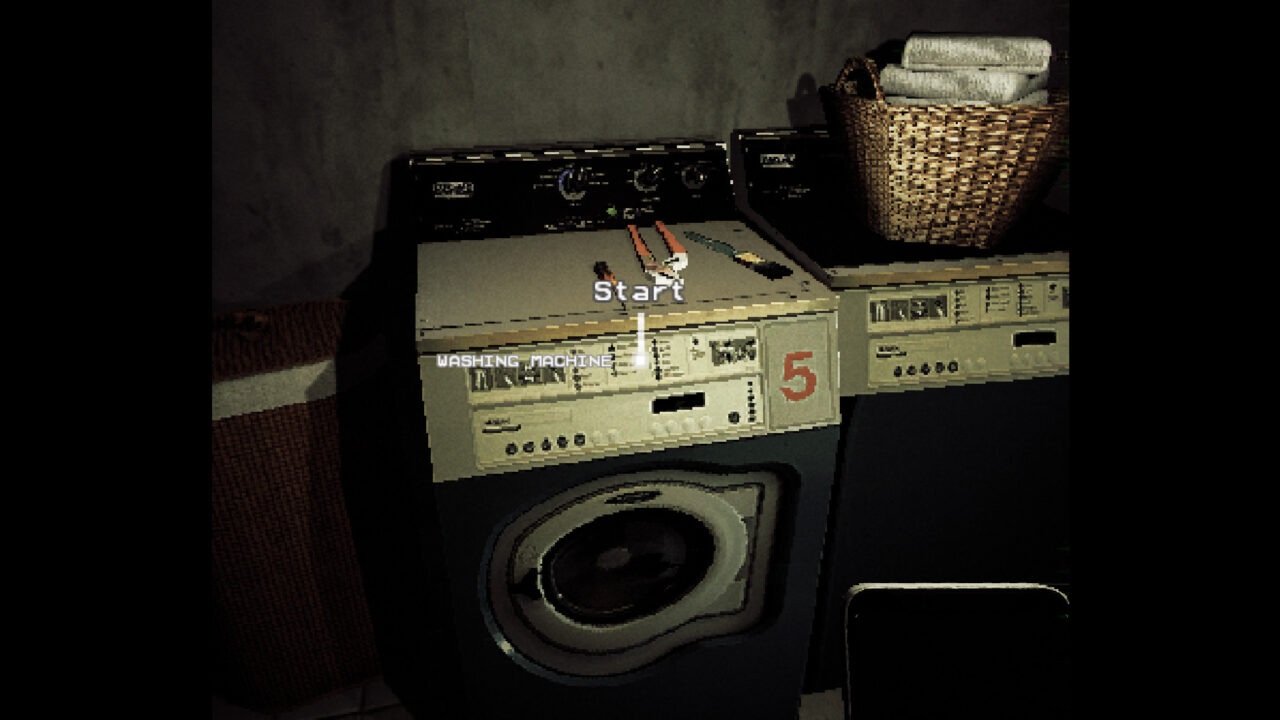
So, MOTHER uses visuals, imposed darkness, and helplessness through your vulnerable children to keep you continually on-edge, always afraid that something might grab you, but also that something worse might befall your children. You’re always fumbling in the dark to keep from blowing the lights, but knowing that something might suddenly appear before you, smirking as it ends your life. You’re lost in this place where reality feels like its crumbling before your eyes. It’s enough to make for a terrifying few nights of trying to survive.
But it’s those vulnerable kids that make you play MOTHER differently. If it were just Mary, I’d flick lights on and off to check to see if things were safe. I’d carefully learn the layout of the apartment and plan my approach. I’d fire my weapons more freely if I so much as thought something was coming. When your son or daughter screams in the middle of the night, though, all of that flies out the window, and you have to let go of your fear of your own death in order to protect someone far more vulnerable.
You have to hurry through the halls, scrambling to look through them fast enough to find your kid in time. You accept that you might get assaulted by the other creature, but that getting to your kid in time takes priority over your own health. You ignore all caution and simply hurry, heart pounding as you ignore everything horror games have taught you about how to survive because someone else needs you more, and you feel far more fear that they will die before you get to them in time.
MOTHER took all of my fears in horror games and made them exponentially worse because I could no longer use my various coping mechanisms to minimize danger. I had to throw caution away and rush into the shadows, knowing full well I could run right into killer monstrosities at any second while trying to get my kids free. I had to face my fears without any of my horror game coping mechanisms, which meant enduring fear in a whole new way. I had to deal with terror without trying to minimize it in any way, letting my fear of dying expand in my mind as it mingled with the fear of letting my kids die at the hands of monsters.
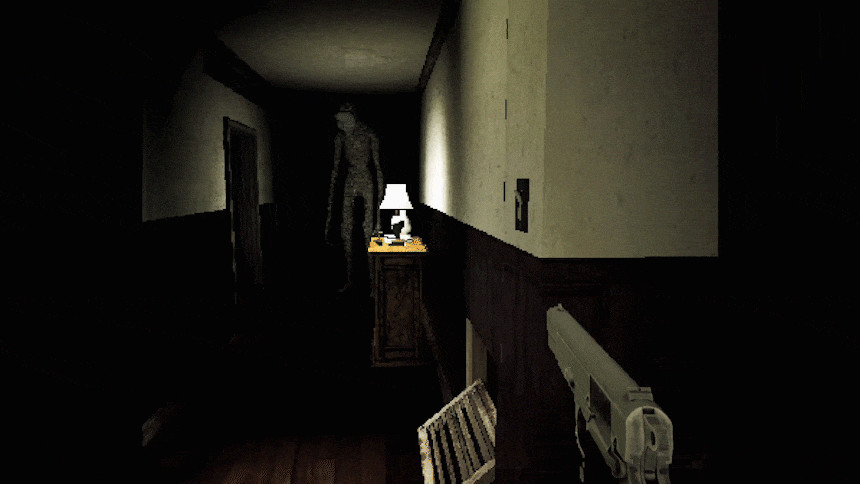
To me, most horror games are about mitigating my fears as best I can. I may be being dogged by ghosts in Fatal Frame and scared to death of them, but I can make small choices to lessen their impact if I approach things calmly. I can travel in the middle of hallways to avoid getting attacked by ghosts in the walls. I can equip better film to do more damage. I can keep my health topped up. I can keep the camera in first-person mode, ready to fire a damaging shot. I can move carefully through an area, watching for signs of attack. I typically have so many choices I can make to calm fear in horror games, but in this game, those choices went out the window the moment I heard my kid screaming.
Maybe it’s because I have my own kids and the thought of something snatching them in the night terrifies me. Maybe I can’t stand to see someone under my care get hurt. Maybe I worried about what would happen to the game if one of the children died permanently. Maybe I just panic easily when there’s a lot of stuff I need to be doing right in a horror game. It could have been any of those things, as perhaps a more level-headed horror player could have put their fears behind them and played cautiously within MOTHER’s parameters. Kept careful track of the lights they had on. Memorized the apartment better. Taken careful aim while shooting a creature that was gnawing on their child.
But something about those vulnerable kids forced a change in my mind and how I approached the game. It made it difficult to concentrate and plan, forcing me into a reactive state. It made everything that much more terrifying because I had someone vulnerable who would be hurt if I hesitated or took things slowly. It filled me with this need to rush in, regardless of my fears, to keep them safe. It made me do it even though I was scared out of my mind to take a single step into that blackened apartment hallway.
MOTHER was a terrifying experience for me, fueled largely by my need to keep the kids safe. It took me out of my familiar horror habits and danger-mitigating strategies and made me lunge into danger, heart pounding. It wound me up tight as I had to rush through its dark corridors, knowing death would likely come with every step. I couldn’t take care, instead pushing myself to stare my fears right in the eye without blinking. Because others needed me to, I had no other choice than to keep moving forward into something that left me shaking, making for one of the most powerful horror experiences I’ve had this year.
Categorized: Editorials Horror Gaming

